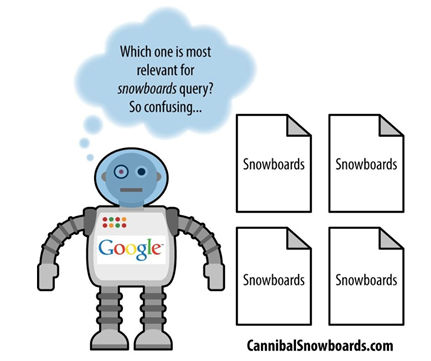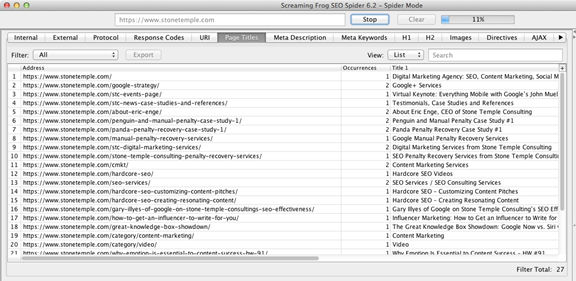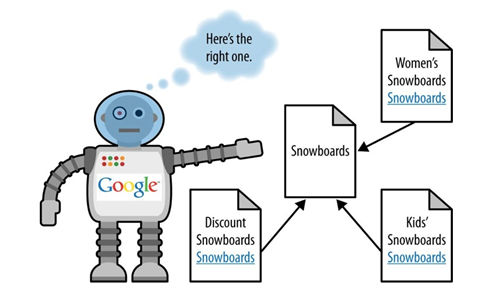Did you know you could be cannibalizing the SEO effectiveness of your site’s important keywords?
In this episode of our Here’s Why digital marketing video series, Art of SEO lead author Eric Enge helps you understand what keyword cannibalization is, how to detect it, and why it matters for your SEO.
Don’t miss a single episode of Here’s Why. Click the subscribe button below to be notified via email each time a new video is published.
Resources
- Keyword Cannibalization and SEO – What You Need to Know
- See all of our Here’s Why Videos | Subscribe to our YouTube Channel
Transcript
Mark: Eric, what is keyword cannibalization?
Eric: Mark, keyword cannibalization is when you have more than one page on your website competing for the same keyword.
[Tweet “Keyword cannibalization is having too many pages on your site targeting the same keywords. Learn more”]
Mark: So, why is that a bad thing?
Eric: Contrary to what some people think, having multiple pages optimized for the same keyword does not make your site more relevant for that keyword. In fact, it can actually send out negative signals to search engines.

Mark: How so?
Eric: First, it’s rare that a search engine is going to rank more than one page on your site for a specific keyword, so you should not have multiple pages targeting a certain keyword. If any of them are going to rank at all, the search engine has to choose which it is, and it may not choose the page that’s best for your purposes.
[Tweet “If too many pages target the same keyword, Google may not rank the one you want. More at”]
Mark: That makes sense, but are there more consequences of too many pages going after the same keywords?
Eric: There sure are. For one thing, it’s usually a sign of poor page quality for both readers and search engines. Imagine if you wrote a book, but every chapter was about the same thing. That would hardly be a page-turner.
Also, this can dilute your external links. If other sites want to link to your page about snowboards, but you have lots of pages about snowboards, chances are the links would be spread out amongst those pages. And that will actually dilute the link equity amongst them.
[Tweet “Too many pages on your site targeting the same keyword may dilute the value of links to your site.”]
You can also risk diluting your internal links as well. Those links are most effective when they point search engines and users to the most authoritative page on your site on the topic.
It can also affect your conversion rates. If you have multiple pages on a topic, it’s likely some of those pages are converting more poorly than others. Why not send all the traffic for that keyword to your best-converting page?
Mark: What can site owners do to eliminate keyword cannibalization?
Eric: First, look for duplicate title tags. You could use a crawler, like “Screaming Frog,” to generate a list of all your page title tags. Here at Perficient Digital, some of our clients that have huge sites can take advantage of our own proprietary crawler that can crawl 100 million pages easily.

But in any case, whatever crawler you use, when you’re done, sort the crawl report by title tags, and wherever you see duplicates, these are your first candidates for possible cannibalization. But you may need to go beyond that and reorganize your entire site architecture.
[Tweet “Learn how to find and eliminate #SEO keyword cannibalization on your site.”]
Visualize what a well-organized architecture would look like, taking the topics and keywords you already have, and regrouping them as necessary. This may reveal to you not only overlaps, but also gaps where you need to create more content.

Mark: Thanks for those insights and tips, Eric. If our viewers want more on this topic, they should check out your in-depth article on keyword cannibalization on the Perficient Digital blog.
Don’t miss a single episode of Here’s Why. Click the subscribe button below to be notified via email each time a new video is published.
See all of our Here’s Why Videos | Subscribe to our YouTube Channel


Interesting post Eric! Thanks for sharing. Great video btw. I was wondering, how do we avoid using the same keywords if there are so many pages?
My thought process on avoiding ranking multiple pages for a keyword is to have a focused strategy of only releasing quality content for a specific topic/keyword and avoiding targeting a keyword with multiple pieces of content.
Stumbling through the jungles of SEO, thanks for the video~
If I have a site with let’s say “betting tips” and I give everyday 3-4 tips and make 3-4 articles with the date in the title, should I make a single article which have all the tips
Not necessarily. One quick mental test you can do: How easy is it to write a unique title for each of the articles? By unique title, I mean something that would help a user recognize one post as being materially different than the other based on the title alone. If you can do that, than having separate posts should work well for you.
Thank you. Will be really hard, but I will try. Probably I will post fewer tips 🙂